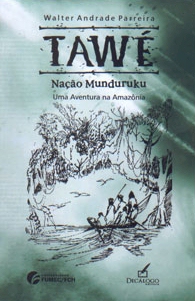|
.
"Tawé, Nação Munduruku – Uma aventura na
Amazônia".  This book tells the true story of an adventure, a journey towards the unknown. The author and his female companion left their city, Belo Horizonte, without a clear destination, without a final mooring place, without knowing either where they were going or how they would get there. The only choice and the only decision made: to take to the road and let it guide them. The road itself would point the way… This book tells the true story of an adventure, a journey towards the unknown. The author and his female companion left their city, Belo Horizonte, without a clear destination, without a final mooring place, without knowing either where they were going or how they would get there. The only choice and the only decision made: to take to the road and let it guide them. The road itself would point the way…
The historic context, the 1970’s, was a period in which the Brazilian youth had basically two ways to cope in society: on the one hand, the political engagement, the resistance and the fight against the military dictatorship; on the other, the cultural resistance, the counter-culture.
The journey that began without a destination reached an unimaginable one: chance took the then 24-year-old couple to the heart of the Amazon, to an unthinkable meeting with the Mõnjoroko (or Munduruku) Indians, also known as the “Head Counters”. They are a people of a warring disposition who used to have as their practice, when threatened or invaded, to behead their enemies, mummify their heads and hang them on poles around their villages, so as to create a ring of “supernatural” protection that would keep the invaders at bay.
They are a people who have branched into two lineages – the “Children of the Sun” and the “Children of the Moon”, a strategy aimed at avoiding consanguineous marriages.
On a Brazilian Air Force Catalina flying boat, a World War II survivor, the young couple reached an Indian Mission and, from there, set out in a canoe on a journey into the jungle. They had as their guide the chief (or tuxaua) of the Mõnjoroko, Tawé, after whom the book is named as a tribute. They faced the rigors of the Amazon winter for countless days and nights – torrential rains and cold weather – and arrived in a place never before seen by any white man. In this place they lived the primitive fight for survival of the Mundukuru and witnessed a relationship with nature and with human beings totally unknown by our civilization. The Mõnjoroko people, rich in wisdom and magic, have as the building blocks of their society the ideals of generosity, fraternity and sharing, as well as respect and reverence to nature and man – manifestations of the sacred.
The journey and the close proximity to the Indians represented a life-changing experience for the author and his companion. About
the author
 |
Walter Andrade
Parreira was born in Sete Lagoas, in the
state of Minas Gerais, in 1950. He is a
psychologist, a psychotherapist and a
professor of psychology in the Humanities
Department of Universidade FUMEC. He also
taught at Universidade Federal de Minas
Gerais and at Pontifícia Universidade
Católica de Minas Gerais. Professor Parreira
authored scientific texts, published in
academic magazines, as well as literary ones,
published in poetry anthologies. He also
wrote award-winning chronicles. |
Copyright
© 2008 - Walter Andrade Parreira | Site desenvolvido por Anderson Fonseca
.
|